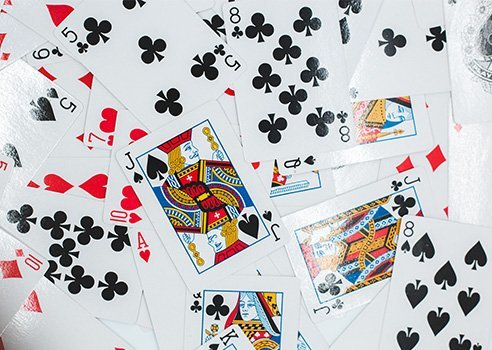Word count: 563 words
Reading time: Just over 2 minutes
The idea of copying another writer may seem distasteful to you, but, trust me, you can learn a lot from the practice…
*
I didn’t cheat on exams when I was in high school. I restricted myself to reading novels tucked inside of textbooks.
But once, in Grade 8, I was caught playing cards with a friend in Latin class. The teacher marched over to our desks, grabbed the cards from our hands and threw them out the window. Because our classroom was on the second floor, I regarded this gesture as highly melodramatic. Imagine: 52-card pick-up, on a sidewalk.
Instead of card games, if only I had learned the skill of copying in school. I know this might sound bad — peeking at another person’s test, or copying phrases you’ve written on your arm. But, really, the practice of copying is not the least bit deceitful as long as you never attempt to pass off another person’s words as your own. (That’s plagiarism.) Instead, the purpose of copying is deeply personal.
What do I mean when I say copy? I intend it literally. You should take a published work — written by an author you respect and admire — and copy part of it word for word. You don’t have to do it in your own handwriting, although some will argue that you’ll feel a deeper connection with the writer if you do. Me? I use my computer. I aim to copy about 1,000 words at a time. I should probably make the effort to do this once a week but right now I manage several times a year. (Hmmm, I feel a writing resolution looming!)
Your objective in copying is to learn about the voice of another author. When you copy the writing of a writer you respect and admire, you absorb that person’s sentence structure, cadence and rhythm. All of these aspects of that person’s writing voice will become more deeply imbued in your own consciousness.
Still feel nervous about the idea? You should know that Benjamin Franklin was a big advocate of the practice and, in fact, taught himself to write this way. But the question remains: whom should you copy? I suggest you look at your own bookshelves or perhaps go to a bookstore or a library and search for authors whose work you find deeply engaging.
A friend of mine has copied the work of E.B. White; I have copied William Zinsser. The choice is up to you. But try to look for someone who is strong in an area in which you are weak. Looking to become better at description? Try Charles Dickens. Looking to become more conversational and personal? Consider Anne Lamott. Wanting to write short, concrete sentences? Ernest Hemingway is your man.
Of course, you can simply READ the work of these writers. But if you take the trouble to copy their writing you will increase the chances that your own writing will benefit. Part of what I like about this suggestion is that it’s so easy.
OK, I’ve now convinced myself. I’m going to start copying weekly. I just glanced at my bookshelves and grabbed Arthur Plotnik’s book Spunk and Bite. Here goes:
Sometimes when I’m digging for the right word, I long for a terrier-like acuity, a canine’s sensory gifts applied to language. Imagine if dogs ever figured out how to write – how to put that spunkiness and bite of theirs into literature. Think of those olfactory superpowers attuned to sniffing out metaphors or….


